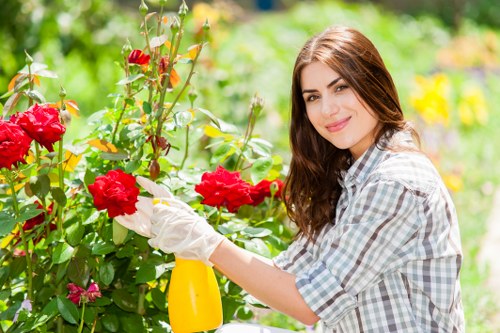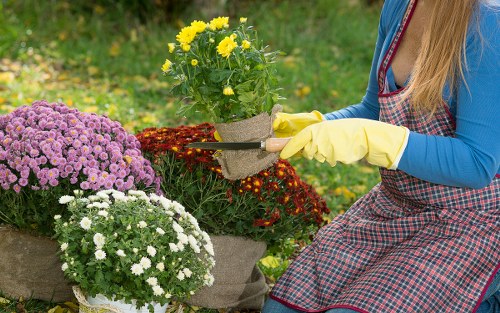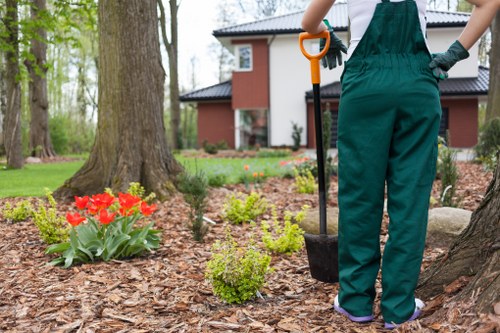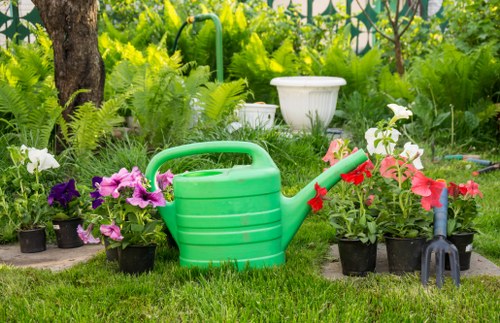Expert Garden Maintenance Services in Fulham

Introduction to Garden Maintenance
Maintaining a beautiful garden in Fulham requires dedication, knowledge, and the right tools. Whether you’re a seasoned gardener or a beginner, understanding the essentials of garden maintenance can transform your outdoor space into a lush, vibrant retreat.
Fulham’s unique climate and soil conditions mean that specific care must be taken to ensure your garden thrives year-round. From selecting the right plants to regular upkeep, each step plays a crucial role in achieving a stunning garden.
In this comprehensive guide, we’ll explore the key aspects of garden maintenance in Fulham, providing you with expert tips and strategies to keep your garden in top shape.

Seasonal Garden Care
Spring Maintenance
Spring is the perfect time to rejuvenate your garden after the long winter months. Start by clearing any debris and dead plants that may have accumulated. This helps prevent pests and diseases from taking hold as the weather warms up.
Planting new flowers and vegetables can bring fresh color and productivity to your garden. Choose species that are well-suited to Fulham’s climate, such as daffodils, tulips, and hardy vegetables like peas and lettuce.
Additionally, fertilizing your garden ensures that plants receive the necessary nutrients for healthy growth. Organic fertilizers are a great choice for promoting soil health and sustainability.

Summer Maintenance
Summer maintenance focuses on keeping your garden hydrated and controlling pests. Regular watering is essential, especially during the hot months. Installing a drip irrigation system can help provide consistent moisture while conserving water.
Pruning shrubs and trees helps maintain their shape and encourages healthy growth. Remove any dead or damaged branches to prevent potential hazards and disease spread.
Managing pests is also crucial in summer. Use eco-friendly pest control methods to protect your plants without harming beneficial insects. Companion planting can naturally deter pests and promote a balanced garden ecosystem.

Autumn Maintenance
As autumn approaches, preparing your garden for the cooler months is essential. Start by harvesting any remaining vegetables and removing spent plants. This helps prevent overwintering pests and diseases from affecting your garden in spring.
Mulching is a great way to protect your soil and retain moisture during the winter. Apply a thick layer of organic mulch around your plants to insulate the roots and improve soil structure.
Planting bulbs in autumn ensures a vibrant display of flowers in the spring. Options such as crocuses, hyacinths, and lilies thrive when planted during this season, providing early color and beauty to your garden.

Winter Maintenance
Winter garden maintenance focuses on protection and preparation for the next growing season. Clear any fallen leaves and debris to prevent mold and pests from damaging your plants.
Protect sensitive plants by covering them with burlap or frost cloths. This helps shield them from harsh weather conditions and frost, ensuring they survive the winter months.
Planning is also key during winter. Take the time to design your garden layout, choose new plants, and order seeds for the upcoming growing season. Proper planning sets the foundation for a flourishing garden in spring.
Essential Garden Tools
Having the right tools is fundamental to effective garden maintenance. Invest in high-quality, durable tools that can withstand frequent use and harsh weather conditions in Fulham.
- Pruning Shears: Essential for trimming and shaping plants, ensuring healthy growth.
- Garden Fork: Useful for turning soil and aerating garden beds.
- Rake: Helps in clearing leaves and smoothing soil surfaces.
- Watering Can: Provides controlled watering for delicate plants.
- Spade: Ideal for digging and planting.
Regularly maintain your tools by cleaning and sharpening them after each use. Properly stored tools last longer and perform better, making garden maintenance tasks easier and more efficient.
Choosing the Right Plants
Selecting plants that thrive in Fulham’s climate is crucial for a successful garden. Consider factors such as sunlight, soil type, and moisture levels when choosing plants.
- Perennials: Plants like hostas and lavender provide year-round beauty and require minimal replanting.
- Shrubs: Boxwood and hydrangeas add structure and color to your garden.
- Vegetables: Tomatoes, peppers, and herbs can thrive with proper care and regular maintenance.
- Flowering Plants: Roses, tulips, and daisies bring vibrant colors and attract pollinators.
- Trees: Small ornamental trees such as Japanese maples can enhance the visual appeal and provide shade.
Incorporate a mix of plant types to create a diverse and resilient garden ecosystem. This diversity helps prevent pest outbreaks and promotes overall garden health.
Soil Health and Fertilization
Healthy soil is the foundation of a thriving garden. Testing your soil’s pH and nutrient levels can help you understand what amendments are needed to support plant growth.
Organic matter, such as compost and aged manure, improves soil structure, fertility, and moisture retention. Regularly adding organic materials to your garden beds enhances the soil’s ability to support healthy plants.
Fertilization should be tailored to the specific needs of your plants. Use balanced fertilizers that provide essential nutrients like nitrogen, phosphorus, and potassium. Avoid over-fertilizing, as this can harm plants and disrupt the soil ecosystem.
Pest and Disease Management
Protecting your garden from pests and diseases is vital for maintaining its beauty and productivity. Regular monitoring and early detection are key to effective management.
- Integrated Pest Management (IPM): Combines biological, cultural, and chemical methods to control pests sustainably.
- Natural Remedies: Use neem oil, insecticidal soap, and other organic treatments to manage pest populations.
- Beneficial Insects: Encourage ladybugs, bees, and other beneficial insects that help control pests naturally.
- Proper Sanitation: Remove diseased plant material promptly to prevent the spread of pathogens.
- Cultural Practices: Rotate crops and plant resistant varieties to minimize disease risks.
Implementing these strategies helps maintain a healthy garden ecosystem, reducing the need for chemical interventions and promoting sustainable garden practices.
Lawn Care in Fulham
A well-maintained lawn is a cornerstone of any beautiful garden. Proper lawn care involves regular mowing, watering, and fertilization to keep the grass healthy and vibrant.
Mowing your lawn at the correct height encourages deeper root growth and enhances drought resistance. Aim to cut no more than one-third of the grass height at each mowing session.
Water your lawn deeply but infrequently to promote strong, resilient roots. Early morning watering reduces evaporation and minimizes the risk of fungal diseases.
Seasonal Lawn Care
Adjust your lawn care routine according to the seasons to maintain its health throughout the year.
- Spring: Reseed bare patches, aerate the soil, and apply a balanced fertilizer to support new growth.
- Summer: Maintain consistent watering, mow regularly, and address any pest issues promptly.
- Autumn: Overseed to fill in thin areas, apply compost, and prepare the lawn for winter by reducing mowing frequency.
- Winter: Protect the lawn from harsh weather by avoiding heavy foot traffic and removing debris that can smother the grass.
By following these seasonal practices, your lawn will remain lush and healthy, enhancing the overall appearance of your garden.
Hardscape Maintenance
The hardscape elements of your garden, such as paths, patios, and fences, require regular maintenance to stay functional and attractive.
Pathways and Patios
Keep pathways and patios clean by sweeping away debris and regularly washing surfaces to prevent moss and algae buildup. Repair any cracks or damage promptly to maintain safety and aesthetic appeal.
Consider sealing concrete or stone surfaces annually to protect them from weathering and staining, extending their lifespan and preserving their appearance.
Fencing and Structures
Inspect fences and garden structures regularly for signs of wear or damage. Repair or replace any broken components to ensure they remain sturdy and secure.
Painting or staining wooden structures not only enhances their look but also provides a protective barrier against the elements, preventing rot and decay.
Garden Lighting
Proper lighting enhances the beauty and functionality of your garden, allowing you to enjoy it even after dark. It also adds a layer of safety by illuminating pathways and entry points.
- Path Lights: Install along walkways to guide visitors and highlight the garden’s layout.
- Spotlights: Use to accentuate focal points, such as sculptures, trees, or water features.
- String Lights: Create a warm and inviting atmosphere for evening gatherings and outdoor entertaining.
- Solar Lights: An eco-friendly option that harnesses solar energy to illuminate your garden without increasing your energy bills.
Choose energy-efficient lighting options and strategically place them to maximize both aesthetics and practicality, ensuring your garden is both beautiful and safe.
Water Features and Irrigation
Incorporating water features like fountains, ponds, or streams can add tranquility and visual interest to your garden. Proper maintenance ensures these features remain clean and functional.
Regularly check for leaks, clean filters, and manage algae growth to keep water features in good condition. Maintaining water quality is essential for the health of any aquatic plants or wildlife that inhabit your water feature.
Efficient Irrigation Systems
Installing an efficient irrigation system, such as drip irrigation or soaker hoses, helps conserve water and provides targeted moisture to your plants. Automated systems with timers ensure consistent watering schedules, reducing the risk of over or under-watering.
Regularly inspect hoses and connections for leaks or blockages, and adjust the system as needed to accommodate seasonal changes and plant growth.
Pruning and Trimming
Pruning and trimming are essential practices for maintaining plant health and enhancing the appearance of your garden. Proper pruning encourages healthy growth, removes dead or diseased branches, and shapes plants for a balanced look.
Best Practices for Pruning
- Timing: Prune different plants at their optimal times to promote growth and prevent damage.
- Technique: Use sharp, clean tools and make precise cuts to avoid harming the plant.
- Frequency: Regular pruning prevents overgrowth and maintains the desired size and shape of your plants.
Understanding the specific pruning needs of each plant species in your garden ensures that you provide the best care, leading to a healthier and more attractive garden space.
Mulching and Weed Control
Mulching is a crucial aspect of garden maintenance, providing multiple benefits such as moisture retention, temperature regulation, and weed suppression.
Apply a layer of organic mulch, like wood chips or straw, around your plants to conserve moisture and reduce the need for frequent watering. Mulch also helps maintain consistent soil temperatures, protecting plant roots from extreme heat and cold.
Effective Weed Control
Weeds compete with your plants for nutrients, water, and light, so controlling them is essential for a healthy garden. Regularly remove weeds by hand or use mulch to prevent their growth.
For persistent weeds, consider using organic herbicides or natural weed barriers to keep them at bay without harming your desirable plants.
Composting and Soil Enrichment
Composting is an eco-friendly way to recycle garden waste and create rich, nutritious soil for your plants. By decomposing organic materials like kitchen scraps, leaves, and grass clippings, compost improves soil structure and fertility.
Start a compost bin or pile in your garden, layering green and brown materials to facilitate decomposition. Turn the compost regularly to aerate it and speed up the process.
Using Compost in Your Garden
Incorporate finished compost into your garden beds and potting mixes to enhance soil quality. Compost adds essential nutrients, increases microbial activity, and improves moisture retention, leading to healthier and more vigorous plant growth.
Regularly adding compost to your soil creates a sustainable and productive garden environment, reducing the need for chemical fertilizers and promoting long-term garden health.
Pest-Resistant Gardening
Adopting pest-resistant gardening techniques minimizes the need for chemical interventions and promotes a healthy garden ecosystem. By choosing the right plants and employing natural pest deterrents, you can reduce pest-related issues effectively.
- Companion Planting: Planting certain species together can naturally repel pests. For example, marigolds deter nematodes, while basil repels mosquitoes and flies.
- Diverse Plant Selection: A variety of plants attracts beneficial insects that prey on common garden pests, maintaining a balanced ecosystem.
- Physical Barriers: Use nets, fences, or row covers to protect your plants from larger pests like birds and rabbits.
- Natural Predators: Encourage predators like ladybugs and praying mantises that help control pest populations naturally.
Implementing these strategies creates a resilient garden less susceptible to pest invasions, ensuring healthy and beautiful plant growth.
Eco-Friendly Garden Practices
Adopting eco-friendly garden practices not only benefits the environment but also enhances the sustainability and health of your garden. Here are some key practices to consider:
- Water Conservation: Use rain barrels to collect rainwater for irrigation, reducing your reliance on tap water.
- Organic Gardening: Avoid synthetic chemicals by using organic fertilizers and natural pest control methods.
- Native Plants: Plant species native to Fulham that are well-adapted to the local climate, requiring less water and maintenance.
- Recycling and Upcycling: Repurpose old materials for garden structures, planters, and decorations, reducing waste and creating unique garden features.
- Energy-Efficient Lighting: Choose solar-powered or LED lights to minimize energy consumption and reduce your garden’s carbon footprint.
Integrating these sustainable practices ensures that your garden remains beautiful and productive while minimizing its impact on the environment.
Professional Garden Maintenance Services
While DIY garden maintenance is rewarding, enlisting the help of professional garden maintenance services in Fulham can take your garden to the next level. Professionals bring expertise, specialized equipment, and a keen eye for detail, ensuring every aspect of your garden is maintained to perfection.
Services typically offered include regular lawn care, pruning and trimming, pest and disease management, soil testing and fertilization, and seasonal clean-ups. Professional gardeners can also provide customized plans tailored to your garden’s unique needs, enhancing its beauty and functionality.
Benefits of Hiring Professionals
- Expert Knowledge: Professionals understand the specific challenges of Fulham’s climate and soil, enabling them to provide targeted solutions.
- Time-Saving: Outsourcing garden maintenance frees up your time, allowing you to enjoy your garden without the hassle of upkeep.
- Consistent Results: Regular professional maintenance ensures your garden remains in optimal condition throughout the year.
- Access to Resources: Professionals have access to high-quality tools and products, enhancing the overall health and appearance of your garden.
Investing in professional garden maintenance services ensures a thriving, beautiful garden that becomes a source of pride and relaxation for years to come.
Conclusion
Maintaining a garden in Fulham is a rewarding endeavor that requires a blend of knowledge, dedication, and the right practices. By understanding the seasonal requirements, choosing appropriate plants, and implementing sustainable gardening techniques, you can create a vibrant and healthy outdoor space.
Whether you prefer to maintain your garden yourself or seek the expertise of professional services, prioritizing regular upkeep and embracing eco-friendly practices will ensure your garden remains a stunning oasis in Fulham.
Contact us today to discover how our expert garden maintenance services can help you achieve your dream garden.